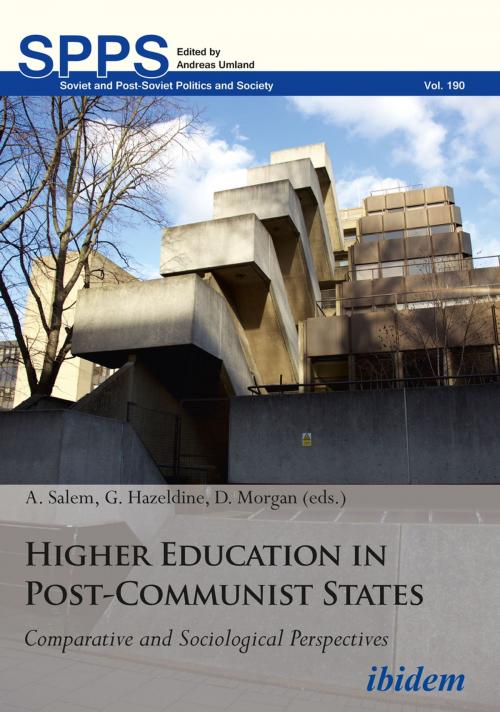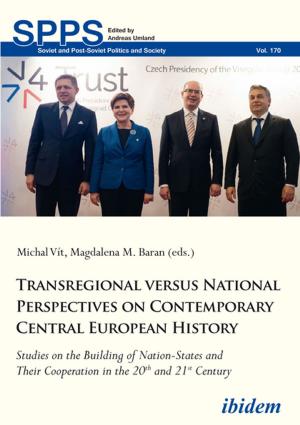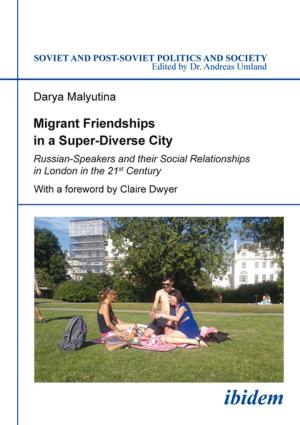Higher Education in Post-Communist States
Comparative and Sociological Perspectives
Nonfiction, Reference & Language, Education & Teaching, Higher Education| Author: | ISBN: | 9783838271835 | |
| Publisher: | Ibidem Press | Publication: | October 30, 2018 |
| Imprint: | Ibidem Press | Language: | English |
| Author: | |
| ISBN: | 9783838271835 |
| Publisher: | Ibidem Press |
| Publication: | October 30, 2018 |
| Imprint: | Ibidem Press |
| Language: | English |
To what extent have universities in post-Communist states adopted the practices and habits of their branded and consumer-oriented equivalents in the English-speaking world? While not assuming that university education in those states reflects in any mechanistic way the regulated, business-led system long established in places such as the U.S. and now being dramatically realized in countries like Britain, this edited collection identifies some marked shifts in the direction of what might best be described as “neoliberalization,” examining its particularities in local situations where establishment ideologies were, until the early 1990s, deeply alien to all kinds of commercially driven entities. Many of the authors are concerned not only with the linked issues of commercialism, instrumentalism, bureaucracy, and managerialism, framed locally and nationally, but also with the meaning and purpose of universities outside or against their status as efficient gatherers of income. The collection makes specific reference to Lithuania, Hungary, Azerbaijan, Ukraine, Georgia and Russia, and takes in both theoretical and empirical studies of diverse but connected subjects, including the marketization of the academy, regional reactions to globalization as expressed in the representational rhetoric of specific curricula, the role and place of civic education, comparisons between educational settings, pedagogies for a critical and ethical consciousness, corporate and state demands and their effects on academic freedom, and the positive potential of new communication technologies. In all these cases, the system of neoliberalism, or rather an uneven process of neoliberalization, forms a backdrop to the particular issues discussed.
To what extent have universities in post-Communist states adopted the practices and habits of their branded and consumer-oriented equivalents in the English-speaking world? While not assuming that university education in those states reflects in any mechanistic way the regulated, business-led system long established in places such as the U.S. and now being dramatically realized in countries like Britain, this edited collection identifies some marked shifts in the direction of what might best be described as “neoliberalization,” examining its particularities in local situations where establishment ideologies were, until the early 1990s, deeply alien to all kinds of commercially driven entities. Many of the authors are concerned not only with the linked issues of commercialism, instrumentalism, bureaucracy, and managerialism, framed locally and nationally, but also with the meaning and purpose of universities outside or against their status as efficient gatherers of income. The collection makes specific reference to Lithuania, Hungary, Azerbaijan, Ukraine, Georgia and Russia, and takes in both theoretical and empirical studies of diverse but connected subjects, including the marketization of the academy, regional reactions to globalization as expressed in the representational rhetoric of specific curricula, the role and place of civic education, comparisons between educational settings, pedagogies for a critical and ethical consciousness, corporate and state demands and their effects on academic freedom, and the positive potential of new communication technologies. In all these cases, the system of neoliberalism, or rather an uneven process of neoliberalization, forms a backdrop to the particular issues discussed.

![Cover of the book Gefährliche Nähe [German-language Edition] by](https://www.kuoky.com/images/2015/march/300x300/9783838265698-D56U_300x.jpg)








![Cover of the book Stalins Kommandotruppen 1941-1944 [German-language Edition] by](https://www.kuoky.com/images/2015/april/300x300/9783838267203-K5C4_300x.jpg)




